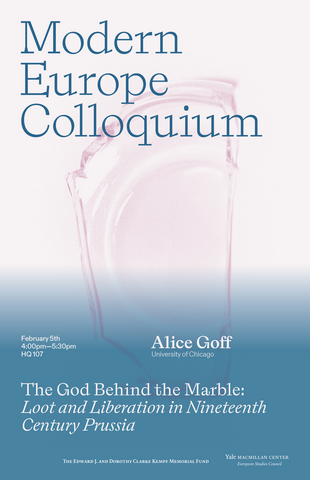The Modern Europe Colloquium presents Alice Goff, Professor, University of Chicago, on “The God Behind the Marble: Loot and Liberation in Nineteenth Century Prussia”
Location: HQ (Humanities Quadrangle), Rm 107, 320 York St.
The Modern Europe Colloquium is generously sponsored by the Edward J. and Dorothy Clarke Kempf Memorial Fund; the European Studies Council of the Yale MacMillan Center
At the turn of the nineteenth century, German intellectuals facing revolution in France and war across Europe found solace in the idea that art could liberate society. They struggled, however, to transform this idea into a reality as all around them European collections were falling prey to the very violence they were theoretically supposed to transcend. Drawing on her newly released book, The God Behind the Marble: The Fate of Art in the German Aesthetic State (University of Chicago Press, 2024), Goff tells of the looting of European art in the Napoleonic period, and of its consequences for the enduring faith in art’s liberatory powers of art in German cultural politics through the modern period.
Bio: I am a historian of German cultural and intellectual life in the modern period, with a particular focus on the nineteenth century. My research and teaching center on the history of art and politics, museums, cultural preservation, and the history of the humanities in German states and in the relationship between Germany and the world.
I am currently at work on a manuscript with the working title, “The God Behind the Marble: Transcendence and the Art Object in the German Aesthetic State, 1794–1848.” The book tells the story of artworks caught up in the looting, iconoclasm, and shifting boundaries of German states during the French Revolution and Napoleonic wars and the consequences of these upheavals for German political, religious, and intellectual practice at the beginning of the nineteenth century. By examining the shifting fortunes of private collections, public museums, and church treasuries, this work examines the frictions that arose between the precarious fates of artworks on the ground and the assertions of art’s ideal autonomy in philosophy and criticism.


